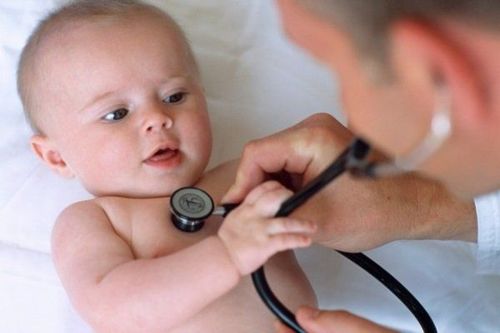This is an automatically translated article.
This article is professionally consulted by Master, Resident Doctor Dang Thi Ngoan - Pediatrician - Neonatologist - Department of Pediatrics - Neonatology - Vinmec Ha Long International Hospital. Uncle used to be a lecturer in the Department of Pediatrics - Hai Phong University of Medicine and Pharmacy, and was granted a certificate in Pediatrics at home and abroad such as: Westmead Hospital, Australia; Hai Phong Medical University and has strengths in the field of diagnosis and treatment of diseases in infants and young children, pediatric resuscitation - emergency.Prenatal and newborn screening is a measure to help diagnose diseases caused by genetic disorders, thereby taking timely intervention and treatment measures, limiting the severe consequences caused by birth defects and reducing birth defects. a minority of people with disabilities and intellectual disabilities in the community, contributing to improving the population's quality.
1. What is prenatal screening?
Antenatal screening is the use of specific screening measures during pregnancy to identify cases of diseases caused by genetic disorders of chromosomes in the fetal stage such as: Down syndrome (triple syndrome) body 21), Edwards syndrome (triploid 18), Patau syndrome (triple trisomy 13) and neural tube defects... From there, advise the family to choose a timely and appropriate treatment.
Time to go for prenatal screening:
During the first 3 months of pregnancy: Pregnant women should go for screening when the gestational age is 11-14 weeks, preferably between 12-13 weeks. Screening in this period includes fetal ultrasound, nuchal translucency measurement at 11-13 weeks and 6 days, and some necessary tests to detect the risk of Down syndrome and a number of other diseases.
During the second trimester of pregnancy: During this period, when you go to the screening clinic, you are given some necessary tests at the gestational age from 14 to 21 weeks; Ultrasound examination of the morphology and structure of fetal organs at the gestational age of 20-24 weeks to detect abnormalities of the nervous system, cardiovascular system, thoracic cavity, malformations of the stomach - intestines, birth sex - urology, bone...
In the last 3 months of pregnancy: This is the time when there are usually no indications for prenatal screening and diagnosis. However, pregnant mothers should actively perform ultrasound during this pregnancy to assess fetal development status and prognosis for delivery.
2. Subjects who need to perform prenatal screening
Pregnant women have miscarriages or stillbirths in previous pregnancies. History of having children with birth defects and genetic disorders Down syndrome... Family with close relatives with birth defects and genetic diseases. Mothers are often exposed to toxic chemicals, radiation... Older women (> 35 years old). In addition, if you do not belong to the above history groups, you can also request a prenatal screening during your prenatal visit.
3. What is newborn screening?
Newborn screening is a modern preventive measure, using medical techniques using probing measures, testing heel blood samples and specific tests for babies right in the first days after birth to diagnose. diagnose and identify suspected cases through screening.
Newborn screening to look for endocrine-related diseases, genetic disorders as soon as the baby is born; allows to detect a congenital and genetic disorder in the newborn baby such as: intellectual disability, G6PD enzyme deficiency (glucose 6 phosphate dehydrogenase), congenital hypothyroidism, congenital adrenal hyperplasia... to physical, mental development, even death if not treated early.
For pathological cases, if detected, prevented, treated and intervened early, the child will develop and lead an almost normal life. Newborn screening is carried out from 36 hours to 7 days of age, medical staff will use a special needle to draw blood from the baby's heel, blot it on a special blotting paper, or draw blood from a vein to send it to a testing center. . The incidence in live births with congenital hypothyroidism is 1 in 4,000 and G6PD deficiency is 0-15%.
4. Importance of prenatal and neonatal screening
Screening helps to detect congenital abnormalities early; help children to be diagnosed and treated early from the time the baby is still in the womb and right after the baby is born.
For newborns and their families: the significance of prenatal and postnatal screening contributes to reducing mortality, helping newborns develop normally or avoid severe consequences due to malformations congenital causes, prevent severe consequences of the disease and improve the future development of children.
For society: This method reduces the number of people with disabilities and intellectual disabilities in the community, contributing to improving the population's quality.
Prenatal and neonatal screening is a simple, inexpensive, and very effective method. When detecting fetal abnormalities, doctors will advise the mother that she can choose to terminate the pregnancy in some cases for reasons such as the fetus will die from in the womb or at birth. cannot survive or can advise to treat the fetus in the womb. From there, medical experts will advise the family to choose the appropriate treatment to terminate the pregnancy with the aim of preventing the birth of sick children, with birth defects that will later be a burden for the family and the family. society.
Currently, Vinmec International General Hospital applies prenatal and newborn screening methods. These include advanced prenatal screening methods such as Non-Invasive Prenatal Screening. Compared with traditional methods, non-invasive prenatal screening (NIPT) gives more accurate results (especially for Down syndrome), and reduces the proportion of pregnant women who are indicated for amniocentesis. necessary. The outstanding advantage of this method is that it is non-invasive and can be carried out as early as the 9th week of pregnancy. In addition, 100% of babies born at Vinmec are screened for hearing and other newborn screenings.
Please dial HOTLINE for more information or register for an appointment HERE. Download MyVinmec app to make appointments faster and to manage your bookings easily.














